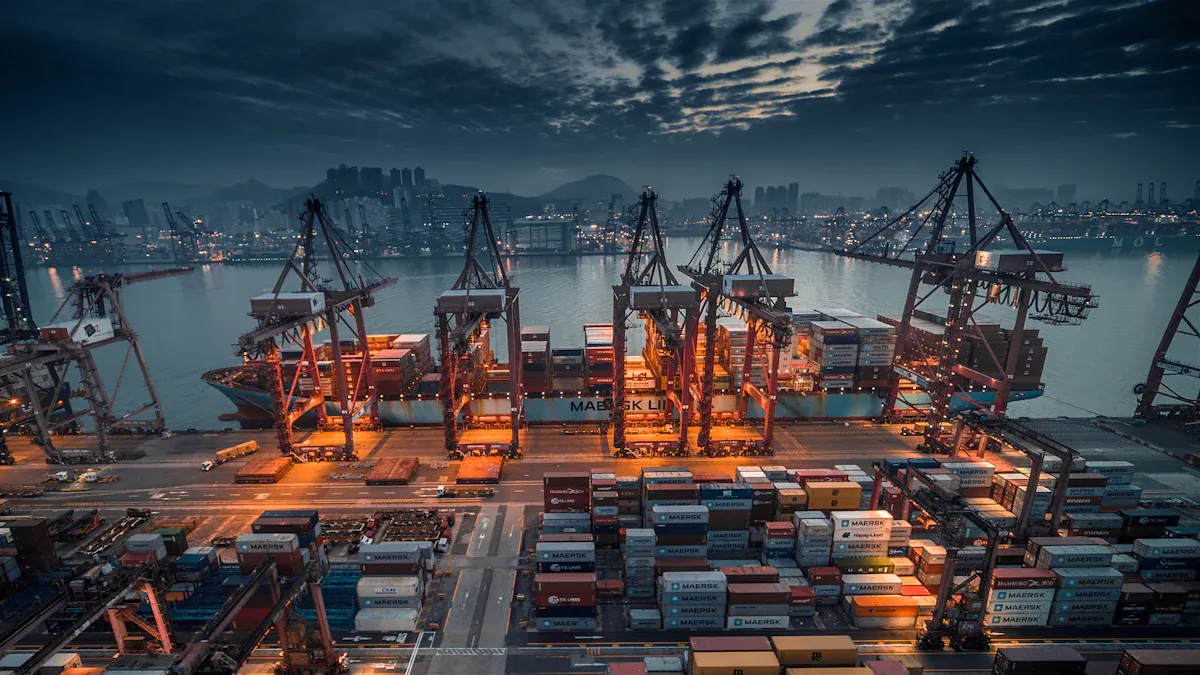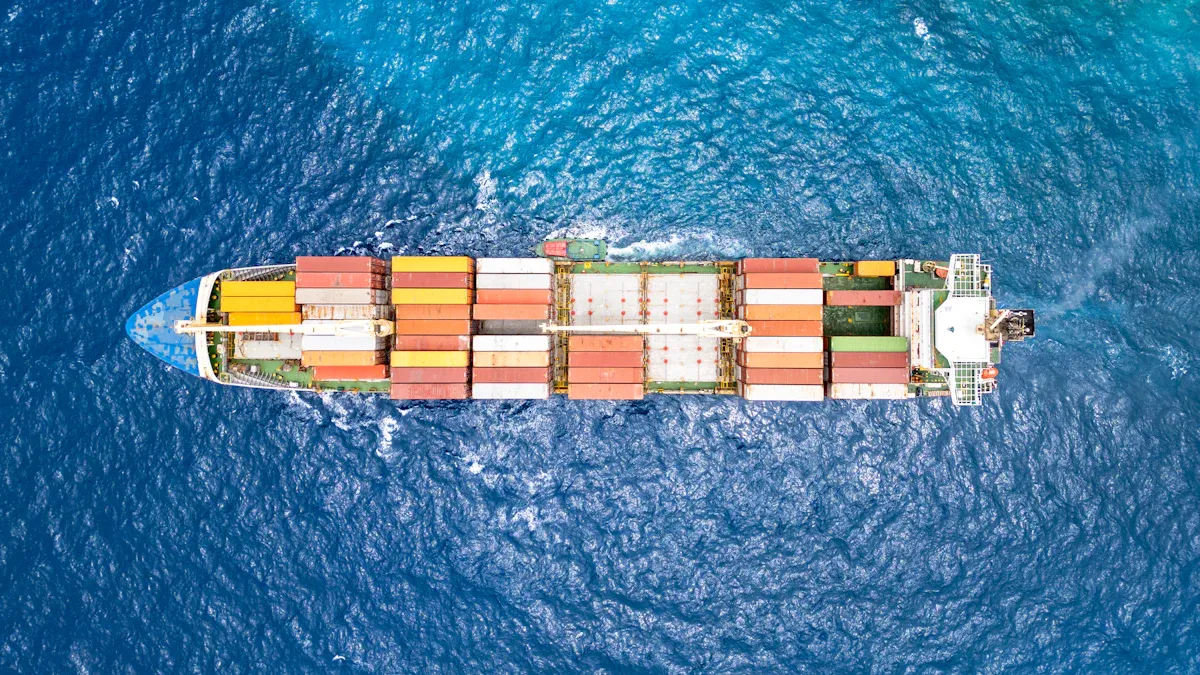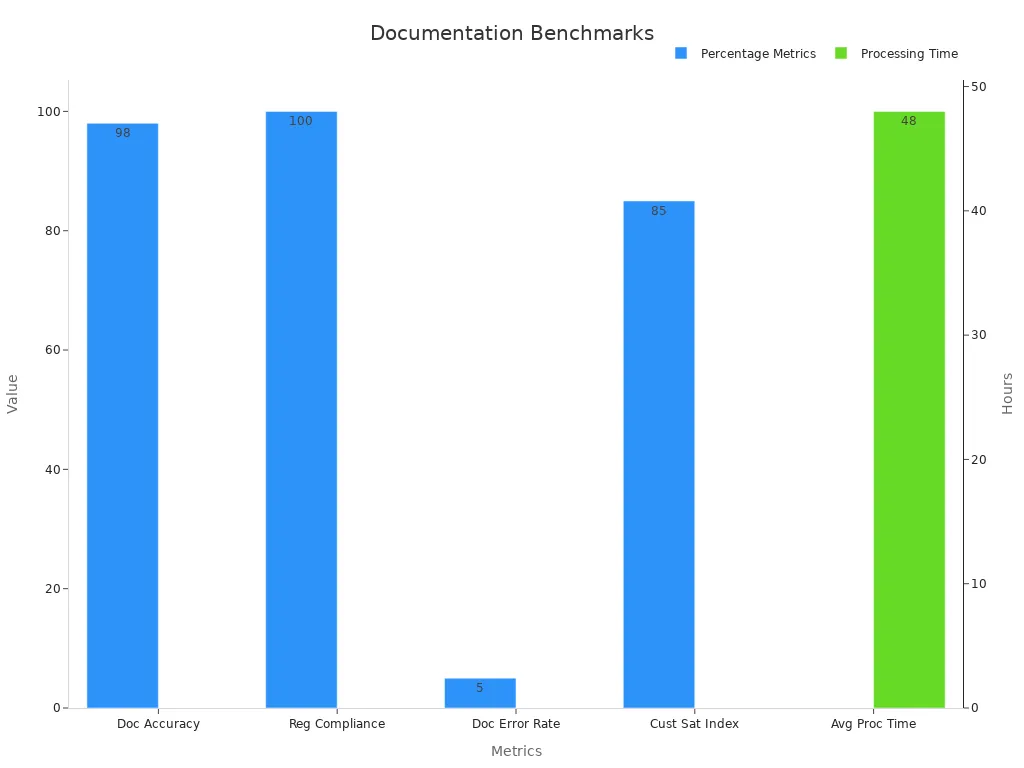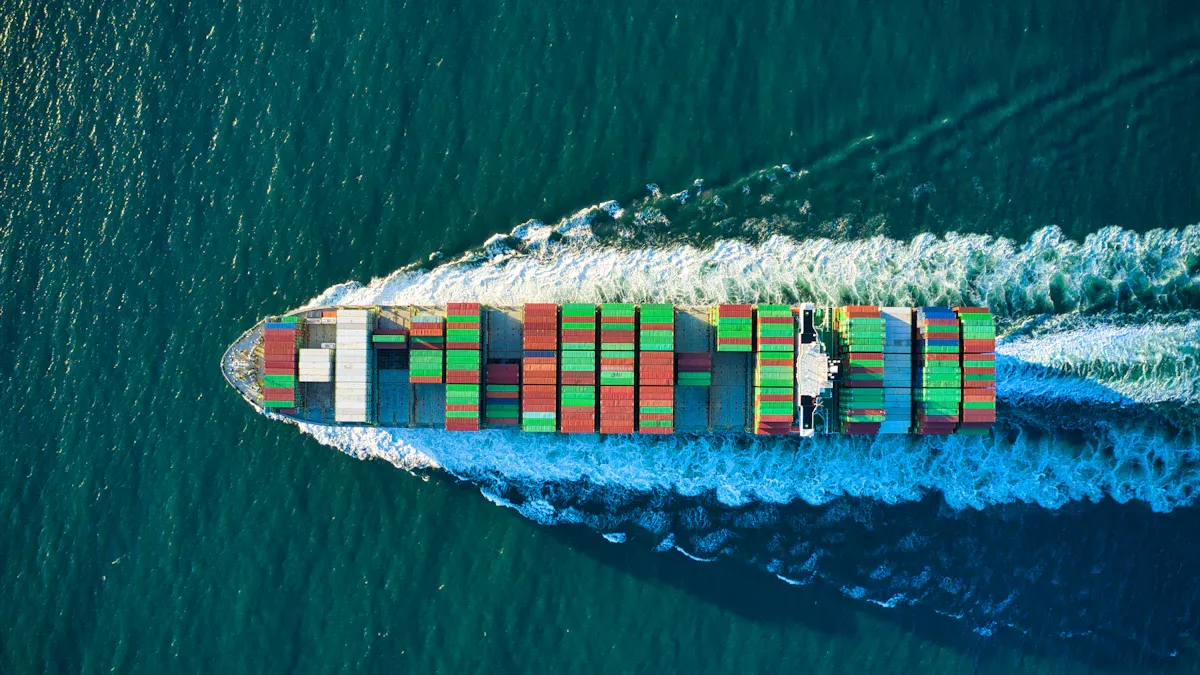What You Need to Know About Ocean Freight Logistics Services

Ocean freight logistics services drive global trade by enabling cost-effective shipping of cargo in containers across long distances. Companies rely on ocean freight for international transportation, leveraging efficient forwarding and reliable logistics service providers. Effective ocean freight forwarding reduces logistics costs, improves reliability, and supports industries like electronics through third-party logistics and advanced forwarding solutions.
Key Takeaways
Using digital platforms for booking and tracking ocean freight improves speed, accuracy, and visibility, helping businesses save time and reduce errors.
Efficient cargo handling, accurate documentation, and smooth customs clearance are essential to avoid delays and ensure reliable delivery.
Choosing ocean freight providers with strong performance, advanced technology, and good customer service leads to cost savings and better supply chain reliability.
Ocean Freight Logistics Services

Booking and Space Allocation
Booking and space allocation form the foundation of ocean freight logistics. Companies rely on digital platforms to secure slots on vessels, which streamlines the booking process and reduces manual errors. These platforms allow businesses to compare rates, select cost-effective options, and plan container journeys in advance. Pre-planning ensures optimal space allocation and improves operational planning for ocean freight services.
JUSDA leverages its consolidated cargo volumes and robust network infrastructure to offer stable pricing and reliable space allocation. Econometric studies show that consolidated cargo volumes help stabilize prices and improve operational efficiency. This approach benefits industries such as electronics, automotive, and FMCG by providing cost-effective and dependable ocean freight shipping.
Digital booking platforms reduce manual effort and speed up the process.
Real-time tracking and live updates enhance visibility and control.
Automated booking increases accuracy and reliability.
Pre-planned container journeys improve space utilization.
KPI Category | Description | Purpose/Impact |
|---|---|---|
Booking Efficiency | Time taken to book cargo, proportion of successful bookings, average booking time | Identifies bottlenecks, improves customer satisfaction and booking speed |
Capacity Utilization | Analysis of cargo distribution, space allocation, cargo fill rate on vessels | Optimizes freight placement, reduces shipping costs |
Cargo Turnaround Time | Measures loading and unloading durations at ports | Minimizes vessel idle time, improves operational efficiency |
Cargo Pickup and Delivery
Efficient cargo pickup and delivery are essential for successful ocean freight logistics. Companies use multimodal transport strategies to balance cost, delivery time, and cargo safety. JUSDA’s logistics services include specialized vehicles and optimized transport networks, ensuring timely pickup and delivery for all types of cargo, including containers and bulk goods.
Project cargo logistics operations focus on vessel efficiency, cargo safety, and timely delivery. JUSDA’s approach includes matching the right vehicle to each cargo type and using advanced scheduling to minimize delays. This ensures that cargo reaches ports on time and supports reliable ocean freight forwarding.
Documentation and Customs Clearance
Accurate documentation and smooth customs clearance are critical in ocean freight logistics. JUSDA’s comprehensive foreign trade services help clients prepare all necessary documents, such as commercial invoices, packing lists, and transport documents. The company integrates customs clearance into its logistics services, reducing errors and speeding up the process.
Industry benchmarks highlight the importance of documentation accuracy and regulatory compliance. High standards in these areas reduce delays and improve customer satisfaction. JUSDA’s experienced customs brokers and digital platforms ensure that documentation meets all requirements and that customs clearance proceeds efficiently.

Metric | Benchmark / Industry Standard | Target / Impact |
|---|---|---|
Documentation Accuracy | Above 98% | Reduces client delays and enhances processing efficiency |
Regulatory Compliance | 100% | Ensures adherence to trade regulations and avoids costly errors |
Average Processing Time | 48 hours | Target to reduce to 36 hours, improving shipment speed |
Documentation Error Rate | 5% | Target to reduce to 2%, minimizing delays and errors |
Customer Satisfaction Index | 85% or higher | Improves brand reputation and customer retention |
Cargo Handling and Storage
Cargo handling and storage play a vital role in ocean freight logistics. Modern ports and warehouses use advanced equipment and IT systems to manage cargo efficiently. JUSDA’s logistics services include cloud warehousing, consolidation, and distribution, which support high throughput and minimize cargo dwell times.
Key performance metrics for cargo handling and storage include vessel turnaround time, cargo volume handled, and equipment utilization rates. JUSDA invests in infrastructure and technology upgrades to enhance operational efficiency. The company’s focus on systematic flow management and training ensures that cargo moves smoothly from arrival to storage and onward shipping.
Vessel turnaround time reflects port efficiency.
Cargo dwell time impacts overall logistics performance.
Quality of port infrastructure supports handling of large cargo volumes.
Shipment Tracking and Visibility
Shipment tracking and visibility are essential for reliable ocean freight services. JUSDA integrates the JusLink intelligent supply chain platform, which uses IoT, cloud computing, and big data to provide real-time tracking and collaboration. This platform enables clients to monitor cargo location, environmental conditions, and estimated arrival times.
Modern logistics services use technologies such as GPS tracking, IoT sensors, AI-powered analytics, and blockchain to enhance shipment visibility. These tools help forecast disruptions, optimize routes, and ensure secure transactions. Cloud-based dashboards display shipment status and key performance indicators, supporting better decision-making and risk management.
Real-time GPS tracking provides continuous updates.
IoT devices monitor cargo conditions and asset status.
AI analytics forecast potential delays and optimize routes.
Blockchain ensures traceability and security.
Dashboards visualize shipment status and bottlenecks.
Value-Added Services
Value-added services distinguish leading ocean freight logistics providers. JUSDA offers a range of services, including cloud warehousing, consolidation, distribution, and comprehensive foreign trade solutions. These services support end-to-end solutions for clients in industries such as electronics, automotive, and FMCG.
JUSDA’s logistics services also include demand forecasting, inventory management, and transport coordination. The JusLink platform enables real-time collaboration among suppliers, customers, and logistics managers. This integrated approach improves order fulfillment, reduces costs, and enhances supply chain reliability.
Note: Choosing a provider with advanced value-added services and digital platforms can help businesses achieve greater efficiency and competitiveness in global trade.
Ocean Freight Shipping Process

Step-by-Step Overview
The ocean freight shipping process involves several key steps that ensure the safe and timely movement of cargo across international waters. Companies begin by packing and preparing goods for shipment. They load cargo onto containers, which are then placed on cargo ships. The ocean transit phase moves the containers to destination ports. Upon arrival, workers unload the cargo, and customs clearance procedures begin. The final step delivers the goods to the consignee.
Packing and preparing goods for shipment
Loading cargo onto containers and ships
Ocean transit to destination ports
Unloading cargo at destination ports
Customs clearance procedures
Final delivery to the consignee
Transit times depend on the route. For example, shipping from Shanghai to Los Angeles takes about 13-20 days. Routes like Shenzhen to Miami may require 31-35 days, while Rotterdam to New York can take 9-12 days. These steps and timelines help businesses measure the efficiency of their ocean freight shipping operations.
JUSDA optimizes each stage of the process. The company uses advanced logistics services and digital platforms to track cargo, manage documentation, and coordinate transportation. This approach reduces delays and improves order fulfillment for clients in global trade.
Types of Shipments and Containers
Ocean freight services handle different types of shipments and containers to meet diverse business needs. Full Container Load (FCL) shipments fill an entire container with goods from one shipper. Less than Container Load (LCL) shipments combine cargo from multiple shippers in a single container. Specialized containers, such as refrigerated or open-top containers, support unique cargo requirements.
Container Type | Description | Best Use Case |
|---|---|---|
Standard Container | General cargo, dry goods | Electronics, FMCG |
Refrigerated (Reefer) | Temperature-sensitive cargo | Food, pharmaceuticals |
Open-Top Container | Oversized or heavy cargo | Machinery, automotive parts |
Flat Rack | Large or awkwardly shaped cargo | Heavy equipment |
JUSDA’s ocean freight services include expertise in handling FCL, LCL, and specialized shipments. The company matches the right container to each cargo type, ensuring safe and efficient shipping. This flexibility supports industries such as electronics, automotive, and FMCG, helping them succeed in global trade.
Key Documents and Compliance
Efficient ocean freight forwarding depends on accurate documentation and strict compliance with trade regulations. Companies must understand customs regulations for each country involved in international shipping. Required documents include commercial invoices, packing lists, and bills of lading. Tariff classifications determine duties and taxes, while valuation methods assess the value of goods. Import and export restrictions may also apply.
Customs regulations for each country
Documentation requirements for import/export
Tariff classifications and duties
Valuation methods for goods
Import/export restrictions
JUSDA’s logistics services include comprehensive customs clearance support. The company’s experienced team manages all documents and ensures compliance with trade laws. Proactive management reduces risks such as delays, penalties, and legal issues. JUSDA’s digital platforms streamline the documentation process, improving accuracy and speed in ocean freight shipping.
Ocean Freight Forwarding and Multimodal Solutions
Ocean freight forwarding services play a vital role in connecting businesses to global markets. Freight forwarders coordinate the movement of cargo, manage bookings, and handle documentation. They also provide multimodal solutions, combining ocean, air, land, and rail transportation to optimize shipping routes.
Common challenges in ocean freight forwarding include competition for cargo space, delays from weather or port congestion, and complex regulations. Poor shipment visibility can lead to customer dissatisfaction. Digital ocean freight forwarding services address these issues by offering instant quoting, guaranteed container space, and 100% shipment tracking. Customers benefit from 24/7 support, optimized routes, and competitive pricing.
Multimodal transportation offers environmental benefits, cost savings, and flexibility. It allows companies to select the most efficient transport modes and adapt to changing conditions. However, it requires careful coordination among stakeholders and robust documentation. JUSDA’s logistics services integrate ocean freight with other transportation modes, using the JusLink platform for real-time tracking and collaboration. This approach improves reliability, reduces costs, and supports sustainable global trade.
Case studies show the value of these solutions. For example, an e-commerce giant integrated ocean and air freight to optimize inventory flow and reduce transit times. An automotive manufacturer used customized ocean air freight routes to meet tight deadlines and lower costs. JUSDA’s expertise in ocean freight forwarding and multimodal logistics helps clients achieve similar results.
Choosing Ocean Freight Providers
Selecting the right ocean freight provider is crucial for business success in global trade. Companies should evaluate providers based on key performance indicators (KPIs) such as on-time deliveries, average wait time, order accuracy, and cost per tonne shipped. High on-time delivery rates and accurate order fulfillment build customer trust and reduce supply chain disruptions.
KPI Name | Description | Importance for Evaluating Ocean Freight Providers |
|---|---|---|
Percentage of shipments delivered on or before the estimated arrival date, with DIFOT focusing on full and timely deliveries. | Critical benchmark for reliability and customer satisfaction; clients use this to select forwarders. | |
Average Wait Time | Time taken to load cargo from truck arrival to departure. | Identifies delays that can increase costs; helps forwarders manage and quote accurately. |
Order Accuracy | Ratio of orders delivered without damage or customs issues. | Reduces costly returns and improves customer trust; important for shipment safety and accuracy. |
Average Freight Cost per Tonne Shipped | Freight cost calculated per tonne, varying by route and season. | Helps forwarders advise clients on cost-effective routes and manage pricing strategies. |
Shipment Quantum and Capacity Utilization | Percentage of container or truck space utilized. | Shows operational efficiency and ability to maximize cargo space, impacting cost and service quality. |
JUSDA stands out as a leading freight forwarder by delivering high performance in these areas. The company’s partnership with Sharp, a global electronics manufacturer, demonstrates this excellence. After implementing JUSDA’s supply chain management platform, Sharp reduced logistics costs by 20%, cut labor costs by 70%, and improved order delivery times by 30%. JUSDA’s focus on innovation, efficiency, and collaboration makes it a trusted partner for ocean freight services.
Tip: Businesses should look for providers with advanced digital platforms, strong industry expertise, and a proven track record in ocean freight forwarding. These qualities ensure seamless coordination, transparency, and reliable shipping for global trade.

JUSDA Solutions
To provide you with professional solutions and quotations.
Ocean freight services support global trade by managing cargo, logistics, and forwarding efficiently. Businesses should evaluate logistics partners using service quality, time efficiency, and digital innovation. The table below highlights key selection criteria for ocean freight services:
Criteria | Practical Implication |
|---|---|
Service Quality | Drives customer loyalty |
Time Efficiency | Improves cargo delivery speed |
Digital Innovation | Enhances logistics performance |
See Also
Discover The Latest Innovations In Sea Freight Logistics
Comprehensive Insights Into Leading Global Logistics Firms
Top Reasons To Join The Best Logistics Webinars Today
